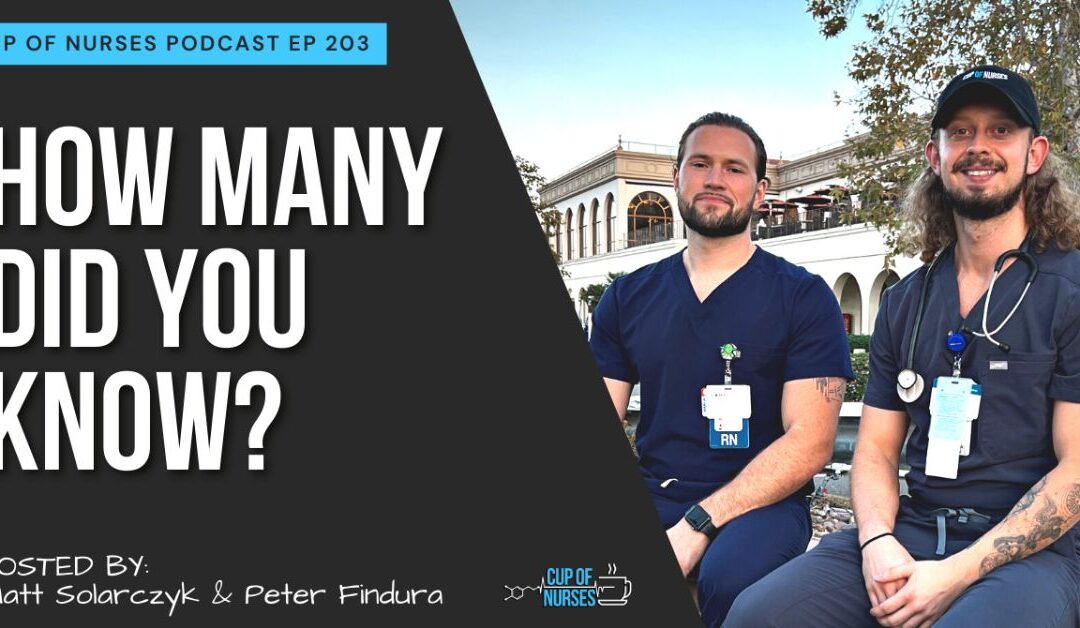
EP 207: When Your Patient Falls
EP 207: When Your Patient Falls
Patient falls are one of the many incidents that could happen to patients in hospitals, and as much as nurses do their best to prevent this from happening, it cannot be avoided. It does happen. But can you avoid this incident?
And what are the usual or common causes of patient falls? Knowing these can help save your patient’s life and your license. It’s best to be prepared at all times.
In today’s episode, we will discuss our experiences when a patient fell. We’ll also discuss how it happened, how we felt, and what we had to do. In addition to that, we will also discuss what to do when a patient falls and the most common causes of it.
What to Do When a Patient Falls
- Call for help and stay with the patient
- Assess the patient for any injuries
- Ask what happened and if they have any pain or hit their head
- If the patient is unable to respond appropriately, assume they hit their head
- Are there any visible injuries?
- Notify MD, Charge, house supervisor
- Take the patient to CT
- Notify family if needed
- Make the patient a forever high fall risk
- Chart what happened
- File an incident report
Reports on Patients Falling in Hospitals
Each year, somewhere between 700,000 and 1,000,000 people in the United States fall into the hospital. A fall may result in fractures, lacerations, or internal bleeding, increasing health care utilization.
- Falls occur at a rate of 3–5 per 1000 bed-days
- Resulting in around 250,000 injuries and up to 11,000 deaths
- Approximately one in four falls result in injury, with about 10% resulting in serious injury.
Most Common Causes of Patient Falls
We looked at several websites to see the most common causes of falls. According to some law firms, the most common causes of falls are:
- Failure to Call a Nurse for Assistance
- The Bed-Exit Alarm is Not Set
- Patients are on High-Risk Medication
- Patient Inaccurately Assessed
- Delayed Response when the Nurse is Called
- Nurse and staff shortages
- Slippery floors and surfaces
- Inefficient work environments
- Poorly lit or obstructed views
According to the joint commission, the most causes of falls are:
- Fall risk assessment issues
- Inconsistency in the rating of patients (Hester Davis tool)
- Risk assessment tools not being an accurate predictor of falls
- Handoff communication issues
- Inconsistent or incomplete communication of patient risk for falls between caregivers
- Toileting Issues
- The patient did not seek help and fell while toileting
- Medications that increase the risk of falls combined with toileting
- Call Light Issues
- The patient did not know, forgot, or chose not to use the call light
- Education and Organizational Culture Issues
- Lack of standardization of practice and application of interventions
- Fall prevention education for patients and families is not used or is inconsistently used
- Patient awareness and acknowledgment of their own risk for falls
- Medical issues
- Patient on one or more medications that increase the risk of falls (e.g., diuretics, laxatives, narcotics, antipsychotics, or anti-hypertensives)
Sources:
https://www.vanweylaw.com/insights/top-reasons-hospital-falls-occur-medical-facilities/
https://www.jacksonwhitelaw.com/az-personal-injury/causes-of-falls-for-patients-in-hospitals/
http://www.hpoe.org/Reports-HPOE/2016/preventing-patient-falls.pdf
To avoid this situation, watch the full episode here 👇👇👇
TIMESTAMPS:
00:00 Introduction
03:02 Matt’s Patient Fall Experience
10:20 Peter’s Patient Fall Experience
16:46 Who is liable for patient falls
20:26 What to do when a Patient Falls
24:55 LAW FIRM: Most commons reasons why patients fall
28:44 Healthcare Joint Commission: Most commons reasons why patients fall
37:52 Wrapping up the show





Recent Comments